Episode 447: Farmer-florist April Vomfell of Flathead Farmworks in Kalispell, Montana; plus, Stories of Resilience guest Tammy Myers of LORA Bloom
April 1st, 2020
Podcast: Play in new window | Download
Subscribe: Apple Podcasts | Podcast Index | RSS | More
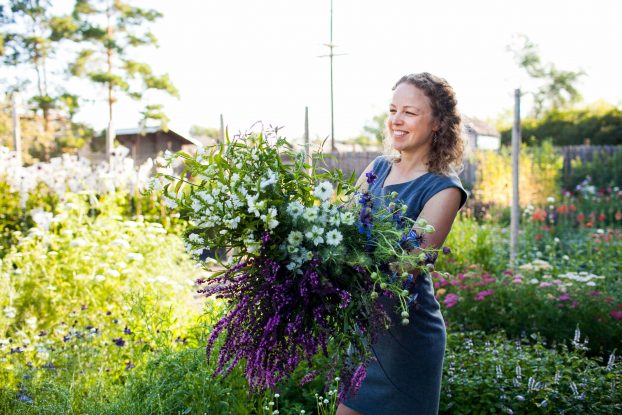
I’m so excited this week to introduce you to April Vomfell of Flathead Farmworks in Kalispell, Montana. We recorded this interview in person on March 14th at Hitomi Gilliam’s Trend Summit in Vancouver, B.C., Canada. At the time, I don’t think April or I really understood that life as we knew it would come crashing to a halt when we both traveled home the following day. So it makes our interview all the more special. I’m glad you’ll hear it and I hope you’ll find our optimism contagious in these uncertain times.
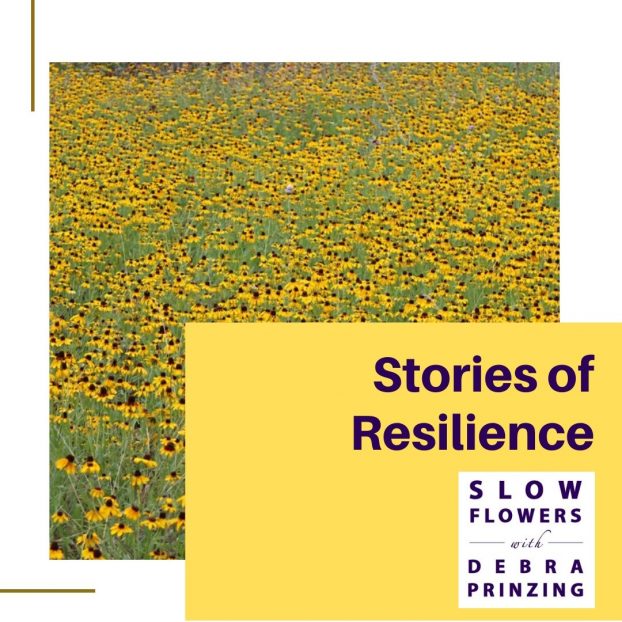
But first, our bonus series here on the Slow Flowers Podcast continues with our next installment of Stories of Resilience. I believe that now, more than ever, the message of sustainability and seasonal and locally-available flowers is top of mind — among consumers, flower farmers and florists.
I want the Slow Flowers Podcast to be a companion to those of you in isolation, away from your physical community of peers, neighbors, customers and friends. I don’t have many answers, but I do want to keep the lines of communication open and accessible through this platform.
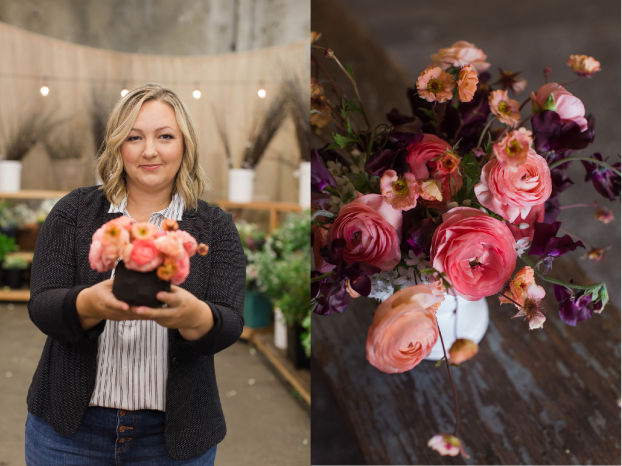
About that Resilience. I invited Tammy Myers of LORA Bloom to share what she’s experiencing as a floral entrepreneur. Based in Fall City, Washington, east of Seattle, Tammy is a past guest of this podcast. She first appeared in 2015 when I featured her studio First & Bloom and its All-American-grown branding. Later, in 2017, I spoke with Tammy and fellow designer Maura Whalen of Casablanca Floral as they discussed “Flower Power,” a collective of local Seattle area florists and farmer-florists.
In the “About” page on her new LORA Bloom web site, Tammy says she will never forget the first time she discovered the difference between locally-sourced flowers and the alternative — imported ones.
“Very early in my first business, First & Bloom, I explored wholesale options in Seattle. I walked into the Seattle Wholesale Growers Market and I thought I had died and gone to heaven. I found buckets and buckets of freshly cut blooms in every color and shape. Blooms that were grown by flower farmers and cut from the fields just hours before. All the textures, the rich colors and hues, the sweet fragrant smell of flowers, and the hardworking faces of the farmers themselves captured my heart. I do believe it was then in that moment, when I fell in love with the floral industry. It was there I found my people. My tribe. It was incredible.”
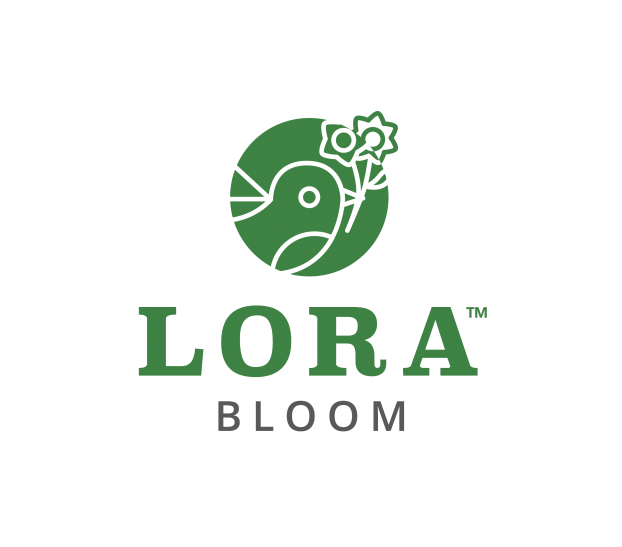
She soon learned the reason this uncommon wholesaler existed as a fresh alternative in the floral industry – thanks to its steady supply of local and seasonal flowers. A great deal has happened since that day six years ago. After years as a florist and a small business owner Tammy wanted to find a new way to connect with customers and increase her online presence. Hearing the same frustrations from friends in the floral business, she set out to change how consumers purchase flowers online. With LORA Bloom, Tammy hopes to change the flower shopping experience to give consumers a way to experience local and sustainable choices. LORA Bloom is committed to sourcing primarily American grown florals and absolutely never uses floral foams in designs.
Find and follow LORA Bloom at these social places:
30 Day Social Media Action Plan from Kalyx Group
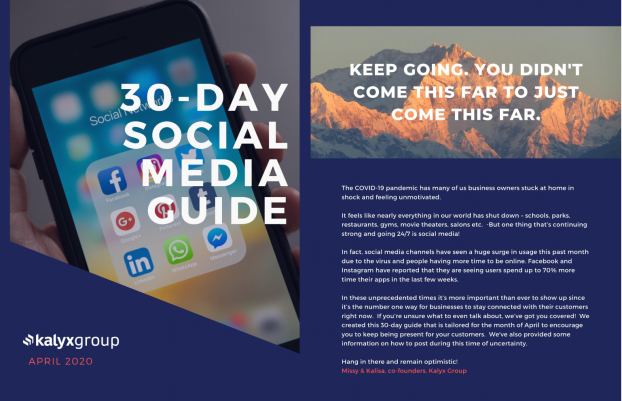
Tammy discussed using a 14-day social media planning tool created by Missy Palacol and Kalisa Jenne-Fraser of Kalyx Group. You may remember their names as speakers at the 2019 Slow Flowers Summit in St. Paul. I’m so happy that Missy and Kalisa have updated their action plan for the entire month of April — and they have permitted me to share this resource with listeners of the Slow Flowers Podcast.
This is free to you! Please follow this link to downloaded Kalyx Group’s 30-day action plan. I’ll see you online — can’t wait to watch how you use their resources for your platform!

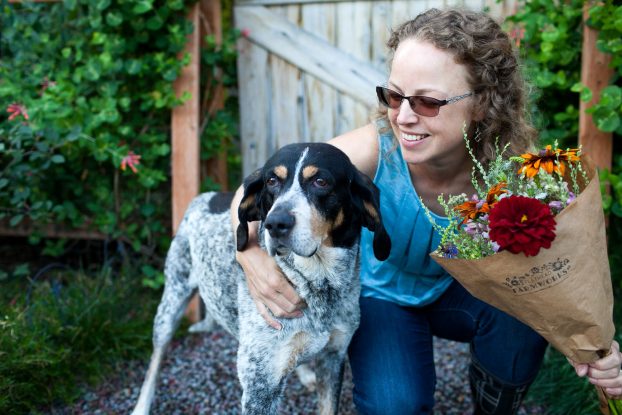
Okay, let’s jump right into my conversation with April Vomfell of Flathead Farmworks.
April is a fourth generation cool-climate gardener. She got her start at a young age, weeding the carrot bed and emptying the compost bucket. Since buying her first camera at age 9, she has been taking pictures of flowers and watching things grow.
Before college, April’s first full-time job was in a flower shop, helping customers and learning about flower care and handling. After receiving a bachelor’s in English, April worked as a copy editor and website editor for several years in Washington, New Mexico and Wyoming. She completed a master’s in library science and then worked in public libraries in Wyoming and Montana for several years before transitioning to jobs in marketing.
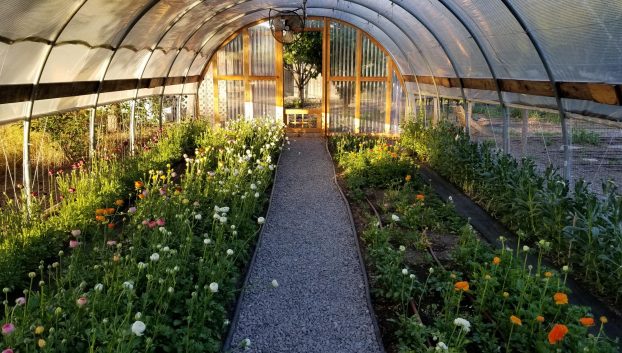
Now as a flower farmer, floral designer and entrepreneur, April combines all of her skills in marketing, organization, writing and planning with her passion for growing beautiful flowers.
April and her husband, Kurt, met in 2013 and discovered their mutual love of wilderness, Montana, good food and gardening.
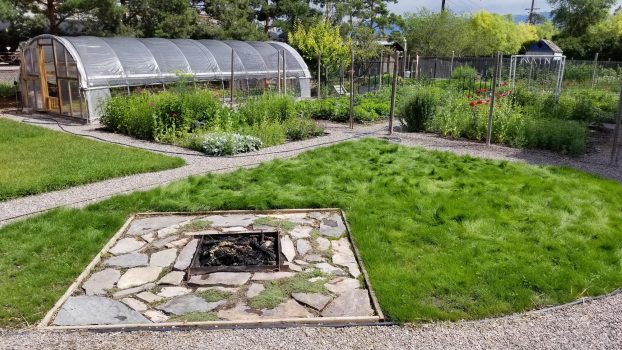
In 2015 they founded Flathead Farmworks to provide fresh vegetables and herbs to local restaurants. As a landscape architect, Kurt is instrumental in the design and functionality of the Flathead Farmworks’ growing spaces. Located in downtown Kalispell, the couple’s half-acre urban farm contains their home, annual and perennial gardens, shade trees and fruit trees, chicken yards and a greenhouse.
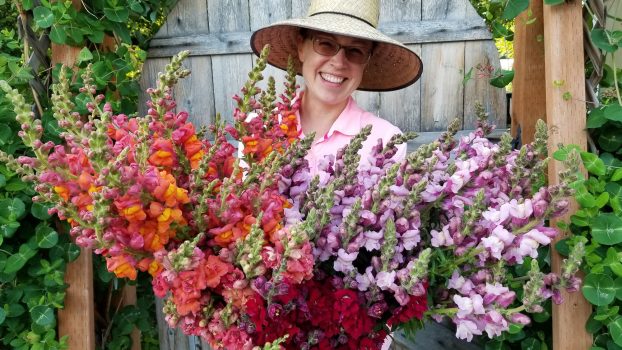
It is a work in progress, with added improvements and new experiments every season. And ask you will hear, flowers have gradually become the main focus of their business. I’m so pleased you can join this conversation and hear more about it from April. Find and follow Flathead Farmworks at these social places:
Flathead Farmworks on Facebook
Flathead Farmworks on Instagram
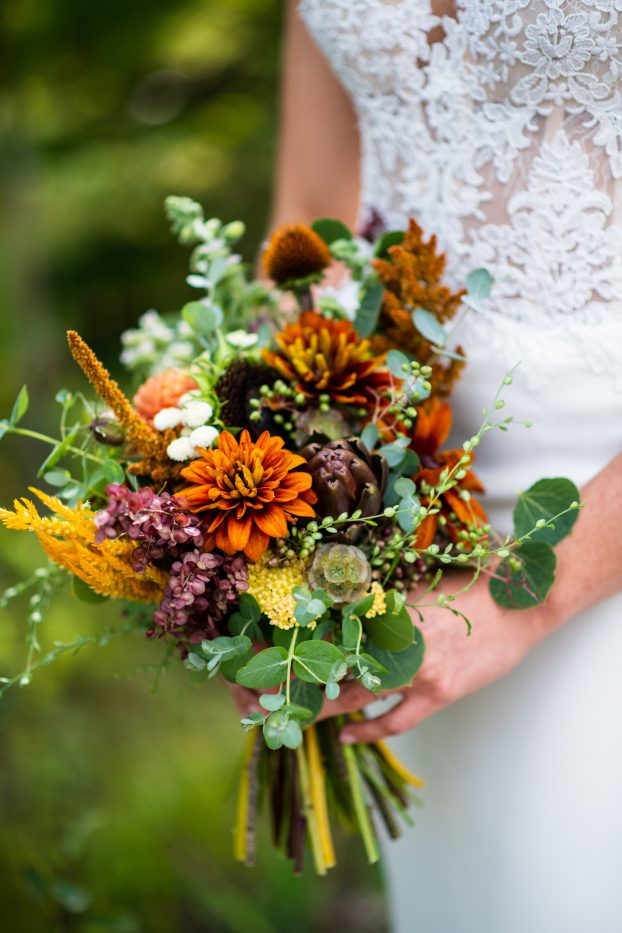
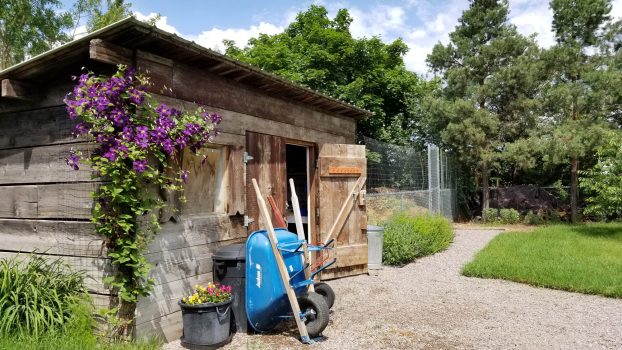
Thanks so much for joining me today as we shared two important conversations with you. Connections and community are more important than ever before – and what we value as truly important and essential has radically changed in the course of just a few weeks.
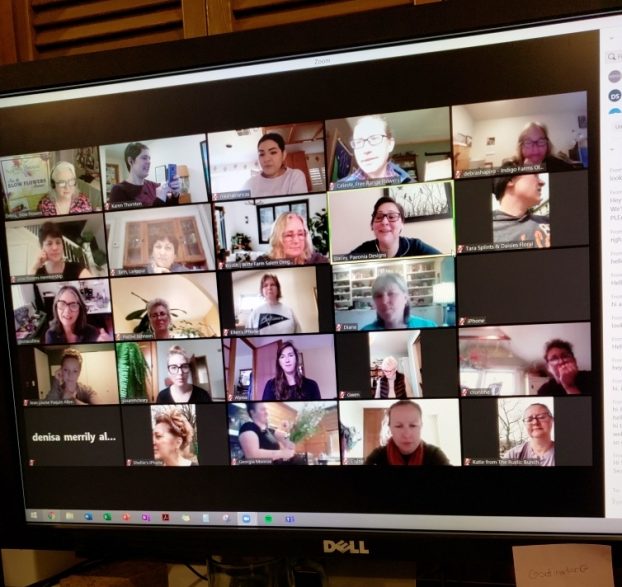
It’s so easy to feel overwhelmed and I know I have felt that way for a few weeks, wondering how Slow Flowers can support our community. To that end, we launched our first Virtual Member Meet-Up on March 27th. Fifty of you, from more than 20 states, joined in on a Zoom platform where we could see each other on the screen of our desktop or mobile devices, and hear from one another. It was really powerful to see your faces and hear your voices. What a beautiful experience. As one flower farmer told me afterwards: “It actually does help to not feel so alone during this crisis.”
If you’re interested in joining the next Slow Flowers Virtual Meet-Up, follow this link and mark Fridays at 9 am Pacific/Noon Eastern for our weekly gathering. The next meeting is April 3rd – I hope to see you there. We will have a few special guests and we also have some fun giveaways you might win.
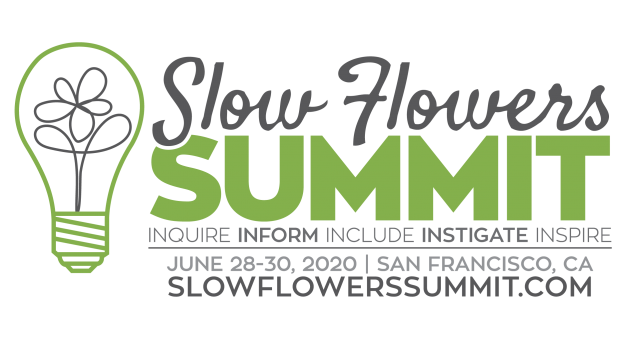
Another important topic to share with you are updated plans for the fourth annual Slow Flowers Summit, scheduled for June 28-30. I want to announce that May 15th is the date when we will make a definitive decision whether to move forward with the original conference dates or reschedule them.
We want to make sure you have 45 days’ notice to adjust your plans if we have to postpone. And just in case, mark October 26-27 as the backup dates for gathering together at our beautiful venue, Filoli Historic House and Garden in Woodside, California. As I said last week: I’m as eager as you are to experience a fabulous conference that’s presented in a safe environment. I hope this plan assures you and assists you in managing your own schedule moving forward into 2020.
You can contact us anytime with questions and I’ve added links to my email and that of our event manager Karen Thornton in today’s show notes. You can also follow the Filoli VISIT Page and Slow Flowers Summit Page for additional updates.
Thank you to our sponsors
Thank you to Florists’ Review magazine. I’m delighted to serve as Contributing Editor for Slow Flowers Journal, found in the pages of Florists’ Review. Read our stories at slowflowersjournal.com.
Johnny’s Selected Seeds, an employee-owned company that provides our industry the best flower, herb and vegetable seeds — supplied to farms large and small and even backyard cutting gardens like mine. Find the full catalog of flower seeds and bulbs at johnnysseeds.com.
Rooted Farmers. Our friends at Rooted Farmers work exclusively with local growers to put the highest-quality specialty cut flowers in floral customers’ hands. When you partner with Rooted Farmers, you are investing in your community, and you can expect a commitment to excellence in return. Learn more at RootedFarmers.com.
Syndicate Sales, an American manufacturer of vases and accessories for the professional florist. Look for the American Flag Icon to find Syndicate’s USA-made products and join the Syndicate Stars loyalty program at syndicatesales.com.

The Slow Flowers Podcast has been downloaded more than 592,000 times by listeners like you. Thank you for listening, commenting and sharing – it means so much.
As our movement gains more supporters and more passionate participants who believe in the importance of the American cut flower industry, the momentum is contagious. I know you feel it, too. I value your support and invite you to show your thanks and with a donation to support my ongoing advocacy, education and outreach activities. You can find the donate button in the column to the right.
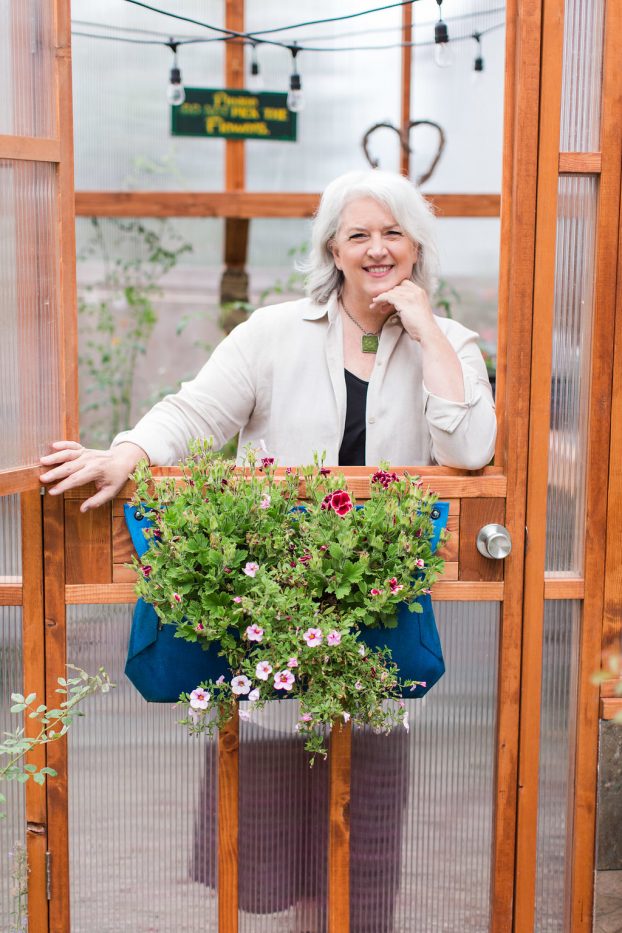
I’m Debra Prinzing, host and producer of the Slow Flowers Podcast. Next week, you’re invited to join me in putting more American grown flowers on the table, one vase at a time. And If you like what you hear, please consider logging onto iTunes and posting a listener review.
The content and opinions expressed here are either mine alone or those of my guests alone, independent of any podcast sponsor or other person, company or organization.
The Slow Flowers Podcast is engineered and edited by Andrew Brenlan. Learn more about his work at soundbodymovement.com.
Music Credits:
Tiny Putty; Heartland Flyer; Gaena; Glass Beads
by Blue Dot Sessions
http://www.sessions.blue
Lovely by Tryad
http://tryad.bandcamp.com/album/instrumentals
http://creativecommons.org/licenses/by-sa/3.0/
In The Field
audionautix.com








